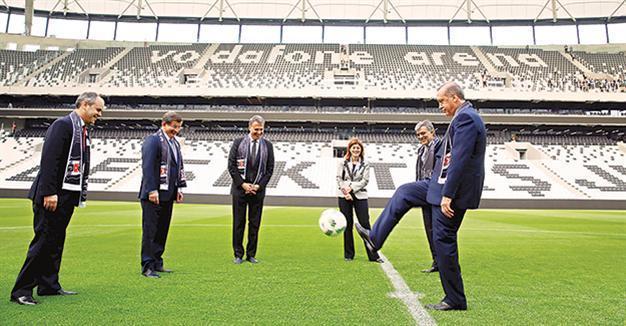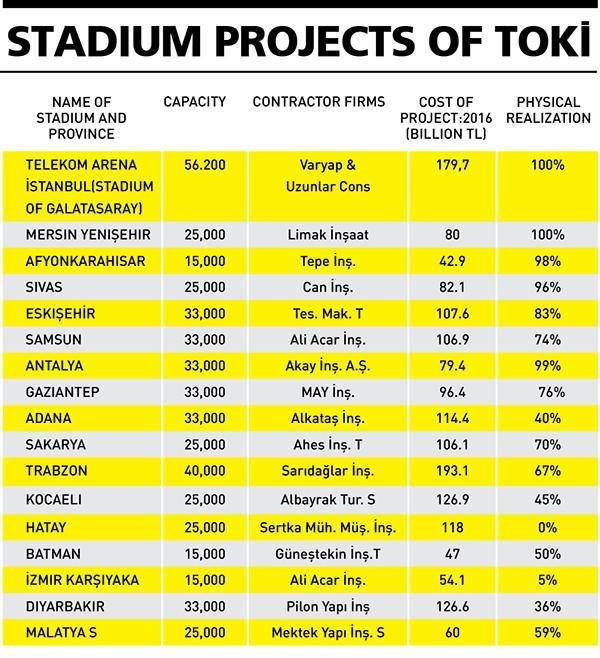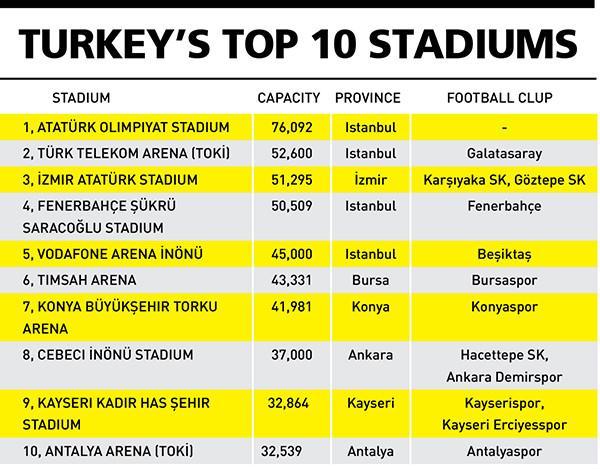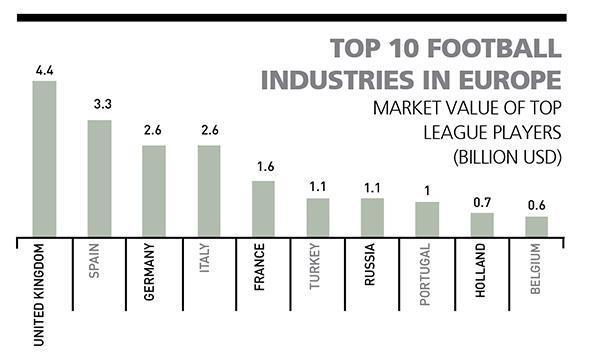Political shadow over the football industry
Mustafa Sönmez - mustafasnmz@hotmail.com

The popular Simon Kuper book, “Football Against the Enemy,” was an analysis of the football-politics relationship and published in the U.K. in 1994. This study became a “cult book” in a short time and was translated into Turkish in 1996 and has been reprinted several times.
Football has rapidly commercialized and become an industry but it is the Mediterranean basin and Latin American countries where politics have intertwined with football.
Particularly in Turkey… Last week a new stadium, Vodafone Arena İnönü, a football shrine, the new stadium of the football club Beşiktaş was inaugurated. One of world’s most important derbies, the game between Fenerbahçe-Galatasaray, was also played last week.

Regardless of whether we like it or not, Turkey’s football industry constitutes one of the important pillars of global football.
To make a comparison, the market value of players in the country’s premier league is added to find the market value of the league. For instance, in the English Premier league, there are 544 professionals and their market value is $4.4 billion. The English first league teams are worth $4.4 billion. Spain comes second with their $3.3 billion worth of players. Germany and Italy have $2.6 billion worth of players. France has $1.6 billion worth of professional first league players. Turkey has $1.1 billion while Russia is close to Turkey. Portugal, Belgium and the Netherlands have an asset of football players worth less than $1 billion but they are in the top 10 of Europe.

Balance sheetsFootball clubs that have become a large holding need to take into account players’ returns when investing in them. Those that trust in the domestic market can make more sensational investments. When Turkey is viewed from this angle, roughly calculated, $1.1 billion worth of football player investments are remarkable for a national income of $750-800 billion.
This investment is due to the country’s football passion and also the confidence in spending associated with this passion. In Turkey where the minimum wage is 1,300 Turkish Liras ($456), young workers save their week’s pay trying to buy a ticket. This is how big the passion is…
When this is so, football player investments in the country, local and international, reach $1.1 billion.
Unequal powerIndustrial football disrupts the balance of power among football clubs in favor of the powerful more every year and this takes the fun out of it. For instance, 58 percent of the $1.1 billion worth of the football player asset belongs to the first four clubs.
Fenerbahçe, with its $174 million, Galatasaray with $150 million, Beşiktaş with 140 million and Trabzonspor with $121 million investments on football players are the top football clubs that have invested in the strongest players for years. The fifth in line is Bursaspor, which has a team worth $71 million; whereas one of the poorest teams, Akhisar, has a team worth $25 million, merely 14 percent of Fenerbahçe’s.
This inequality exists in other countries also. For instance, the top four in the Premier League, Chelsea, Arsenal, Manchester City and Manchester United, constitute 40 percent of the whole league’s assets. In Spain, Read Madrid and Barcelona football players alone are worth 40 percent of the Spanish league. PSG represents 30 percent of the French league. When the situation is like this, the other 10 to 15 teams are like wall flowers playing in the pitch. The more football clubs are commercialized, the more political actors influence them.
The new stadium of one of Turkey’s top three clubs, Beşiktaş, started construction in 2013. Its recent opening ceremony attended by President Recep Tayyip Erdoğan and only by Justice and Development Party (AKP) member politicians once more drew attention to the football-politics relationship.
The new stadium is named Vodafone Arena İnönü because communication giant Vodafone is the sponsor. Its inauguration on April 10 was done with a limited invite-only audience while spectators were not allowed in. The Beşiktaş community, especially its most active group, çArŞı, is not on good terms with the AKP. çArŞı, one of the main actors in the 2013 Gezi incidents, was even taken to court on charges of “organizing illegal demonstrations and [an] attempt to topple the government.”
Beşiktaş Chair Fikret Orman said they have spent $100 million for the stadium, all of which they financed themselves. He said they have sold seasonal boxes and that Vodafone did not directly contribute to the construction but according to the sponsorship agreement will make an annual payment. Orman said the income difference between them and the top two clubs Fenerbahçe and Galatasaray has now become 100 million euros, stating that Galatasaray has an income of 157 million euros, Fenerbahçe 127 and Beşiktaş 50 million.

Despite inadequate resources and limited means, investments such as transfers of foreign players, constructions of stadiums have multiplied the debts of clubs, creating trouble especially before European football authorities. For instance, behemoth Galatasaray has been banned from European cups for one year by UEFA because it failed to meet the criteria. At the beginning of 2016, debts of clubs in the Super league totaled 3.5 billion Turkish Liras. The burden of debt forces clubs to ask assistance from the government, thus obliging them to the shadow of politics.
A project being developed dictates that three state banks will undertake the debts of football clubs and restructure them with low rates for 10 years. According to this project, the debts of clubs to private banks amounting 2.5 billion liras will be undertaken by Ziraat Bank, Halkbank and Vakıfbank. Political steps involving football come in the form of offering infrastructure to club fans.
The ruling AKP has especially concentrated on building stadiums in Anatolian cities to lure the masses passionate about football. The Mass Housing Authority (TOKİ) the main aim of which is building cheap houses, has been engaged in stadium constructions.
Being a conscious fan
Like in other countries, in Turkey also, football is commercialized and industrialized; its weak economic profile attracts politics and political ambitions with its access to masses through football. The means to influence fans open the way for several games to be played over football.
This situation angers those who want to see football as football, and being a football club fan as an innocent identity. Being a football club fan with awareness could be developed through implementing several methods such as participation of fans in club management, no obstruction for memberships, transparency, accountability and less commercialization. Perhaps also by lowering targets and demands.
Indeede, these will come through organization, patience and belief…
 The popular Simon Kuper book, “Football Against the Enemy,” was an analysis of the football-politics relationship and published in the U.K. in 1994. This study became a “cult book” in a short time and was translated into Turkish in 1996 and has been reprinted several times.
The popular Simon Kuper book, “Football Against the Enemy,” was an analysis of the football-politics relationship and published in the U.K. in 1994. This study became a “cult book” in a short time and was translated into Turkish in 1996 and has been reprinted several times.

